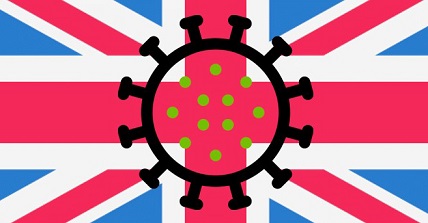United Kingdom Witnessing The Start Of A Gradual COVID-19 Surge In Time For Hay Fever Season
Nikhil Prasad Fact checked by:Thailand Medical News Team Apr 13, 2024 1 year, 1 week, 6 days, 16 hours, 46 minutes ago
COVID-19 News: As the United Kingdom transitions into spring, a shift in health trends is becoming apparent. This
COVID-19 News report delves into the recent data from various surveillance systems monitoring COVID-19, influenza, and other respiratory diseases. It highlights the current status of these illnesses, the implications of their co-occurrence, and offers insights into how individuals can protect themselves during this period.
 United Kingdom Witnessing The Start Of A Gradual COVID-19 Surge
Current Health Landscape
United Kingdom Witnessing The Start Of A Gradual COVID-19 Surge
Current Health Landscape
The data from week 15 of 2024 reveals intriguing patterns in respiratory illnesses. While influenza activity continues to decline, COVID-19 has shown a slight uptick. Additionally, respiratory syncytial virus (RSV) activity remains relatively low across all indicators. These trends are crucial as they coincide with the onset of hay fever season, adding complexity to public health considerations.
Influenza Insights
The data indicates a decrease in influenza positivity rates, with stability in influenza-like illness consultations. Hospitalization and ICU rates for influenza have also seen a decline. However, the co-circulation of multiple influenza strains, including A(H1N1) and A(H3N2), alongside sporadic influenza B activity, warrants continued vigilance.
COVID-19 Trends
Contrasting influenza, COVID-19 has shown a slight increase in activity, reflected in rising case rates and hospitalizations. The elderly population remains most vulnerable, emphasizing targeted interventions for this demographic. Despite stable ICU admissions, the overall landscape suggests a nuanced resurgence of COVID-19, necessitating ongoing public health measures.
SARS-CoV-2 positivity rates surged to 4.1% from the preceding week's 3.4%. This metric gauges the proportion of positive tests among symptomatic individuals tested at sentinel laboratories, as reported via the Respiratory DataMart surveillance system.
In Pillar 1, COVID-19 case rates and positivity exhibited a notable increase across various demographics and geographic regions during week 14.
Hospitalizations due to COVID-19 experienced a slight uptick, reaching 1.77 per 100,000 compared to the previous week's 1.63 per 100,000.
ICU admissions for COVID-19 remained consistently low at 0.06 per 100,000 throughout week 14.
The total count of confirmed COVID-19 acute respiratory incidents saw a marginal rise relative to the previous week, registering 11 incidents across England during week 14.
The West Midlands emerged with the highest regional hospital admission rate, currently standing at 2.45 per 100,000.
Individuals aged 85 years and older exhibited the highest hospital admission rate, escalating to 19.91 per 100,000. A minor increase was also observed across most other age brackets.
;https://www.gov.uk/government/statistics/national-flu-and-covid-19-surveillance-reports-2023-to-2024-season">https://www.gov.uk/government/statistics/national-flu-and-covid-19-surveillance-reports-2023-to-2024-season
https://assets.publishing.service.gov.uk/media/6617bb45cb25981d2f585f44/Weekly_flu_and_COVID-19_report_w15.pdf
https://twitter.com/UKHSA/status/1778428231827198163
The new surge in the United Kingdom is being driven by the newer sub-lineages of SARS-CoV-2 variant JN.1 namely KP.1.1, KP.2.1, KQ.1, KR.1 and KS.1.
As usual despite mounting evidence that the COVID-19 mRNA vaccines are driving a lot of adverse health issues and are possibly not effective against the new JN.1 sub-lineages, UK health authorities are still pushing the vaccines as the only solution to curb a new COVID-19 surge. NHS England has finalized details for the Spring 2024 COVID-19 vaccination initiative. Scheduled activities include visits to older adult care facilities and eligible housebound patients commencing on April 15, 2024. Vaccinations for all other eligible cohorts are slated to commence on April 22, 2024, concluding by June 30, 2024.
RSV and Other Viruses
RSV, adenovirus, human metapneumovirus (hMPV), parainfluenza, and rhinovirus exhibit varied positivity rates, with notable concentrations among children under 5 years. This age-specific prevalence underscores the importance of age-tailored strategies in managing respiratory infections.
Genomic Surveillance and Vaccine Characterization
The UK Health Security Agency's genomic surveillance reveals predominant SARS-CoV-2 variants, guiding vaccination strategies. Similarly, influenza virus characterization aids in aligning vaccine strains with circulating variants, enhancing vaccine effectiveness.
Seasonal Factors and Immunity
As spring unfolds, hay fever season and fluctuating temperatures impact respiratory health. Cold air's influence on immunity underscores seasonal vulnerability to respiratory infections, necessitating heightened preventive measures.
Hay Fever Season in United KIngdom
Every year in the UK, millions of individuals experience the adverse effects of pollen exposure with many developing hay fever.
The pollen season in the UK typically unfolds in three distinct yet overlapping phases:
-March to May: This period marks the blossoming of trees like hazel and birch, initiating the first wave of symptoms for many pollen allergy sufferers.
-May to July: Grass pollen becomes predominant, constituting a significant -portion of the country's pollen load during this time.
June onwards: Weed pollen, including varieties like dock and mugwort, begins to appear and can persist well into the autumn months.
https://ukhsa.blog.gov.uk/2024/02/23/will-climate-change-make-the-effects-of-pollen-worse/
The hay fever season and rising COVID-19 infections are likely to aggravate the situation, both in infected individuals and also on the public healthcare infrastructure.
Public Health Recommendations
To mitigate illness risks, maintaining hand hygiene, avoiding close contact with symptomatic individuals, and adhering to vaccination guidelines remain crucial. Furthermore, timely symptom recognition and appropriate healthcare-seeking behaviors contribute to individual and community well-being.
Conclusion
The confluence of COVID-19 resurgence, influenza dynamics, and seasonal factors presents a multifaceted public health challenge in the United Kingdom. Through robust surveillance, genomic analysis, and targeted interventions, stakeholders can navigate this complex landscape, safeguarding population health during the transition into hay fever season and beyond.
For the latest
COVID-19 News, keep on logging to Thailand Medical News.
